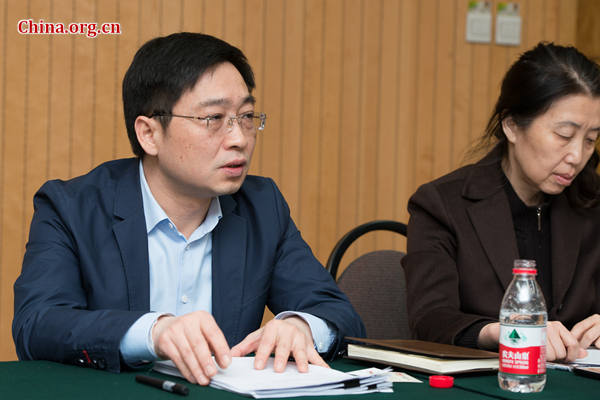Foreign experts' opinions matter in gov't work report
- By Chen Boyuan
 0 Comment(s)
0 Comment(s) Print
Print E-mail China.org.cn, March 9, 2016
E-mail China.org.cn, March 9, 2016
Foreign experts have contributed their wisdom to the drafting of this year's government work report, and a senior official at China's State Administration of Foreign Experts Affairs recounted some of the stories behind this aspect.
|
|
|
Gao Xiang (L), director-general of Department of International Cooperation, also the spokesperson, of the SAFEA, answers the questions from the press on foreign experts' role in the drafting of the government work report on March 3 in Beijing. [Photo by Chen Boyuan/China.org.cn] |
The international community has reacted positively to China's latest government work report delivered by Premier Li Keqiang on March 5 at the opening of the NPC annual session.
On the same afternoon, Huang Shouhong, head of the team drafting the report, in a briefing on the work, acknowledged foreign experts' contributions, saying 13 of them from seven different countries, had shared their insights and suggestions.
On March 8, three days after the final government work report was revealed to the public, Gao Xiang, a senior official with China's State Administration of Foreign Experts Affairs (SAFEA), recounted how these 13 international experts helped in the drafting stage at a special seminar on Jan. 12.
"Among them are Edmund Phelps, 2006 Nobel laureate in economics, and former U.S. Secretary of Energy Steve Chu, who won the Nobel Prize in physics in 1997. Others are old friends of China who know it well," said Gao.
The experts came from the United States, Britain, Austria, the Netherlands, Japan, South Korea and Singapore. Many of them are either holding important positions in China now or had such experiences in the past. The consultation symposium with foreign experts were jointly organized by the SAFEA and the State Council Research Office, the principal agency for drafting the annual report.
The experts offered their opinions regarding their own field, including innovative economic approaches, financial risk control, clean energy, cooperation on the Belt and Road, the middle income trap and health care reform.
British expert Richard Horton, editor-in-chief of The Lancet, a UK-based medical journal, lauded China's achievements in public health but also pointed out that the high mortality rate for heart conditions, smoking, obesity and diabetes would still be pressing challenges for the developing health care system.
"The government has introduced tougher bans on (tobacco) advertising in mass media, public places, public transport, and outdoors. However, progress has been slow," Horton said, suggesting that China should "consider establishing a national tobacco control bureau, reporting directly to the State Council, to coordinate tobacco control actions."
He also pointed out that the situation regarding overweight and obesity is now of such urgency that a national strategy is urgently needed.
The symposium was the second of its type. The first such discussion was held during the same period last year to help with the drafting of the 2015 annual government work report. "It was a trial, an attempt indeed, and the central leaders were quite satisfied with this mechanism, thinking it was necessary and important in the report's drafting. That's why we continued with the format and will formally establish this mechanism for future such reports," the SAFEA official said.
"These foreign experts highly valued the Chinese government's attitude in drawing on international opinions while drafting such an important political document. They said the symposium reflected the Chinese government's broad minded approach and its confidence," said Gao.







Go to Forum >>0 Comment(s)